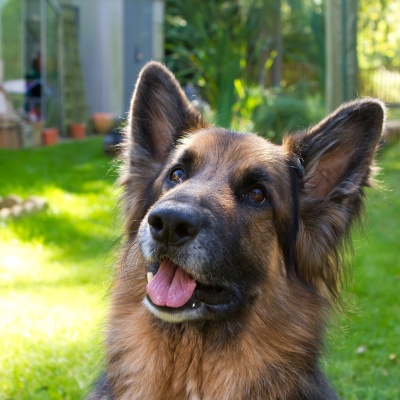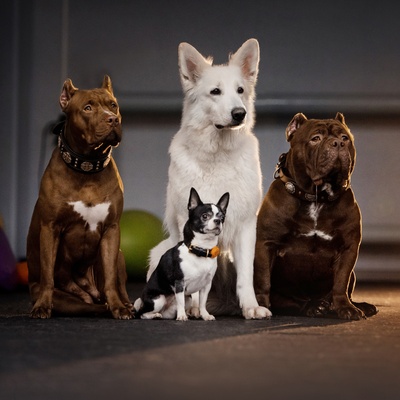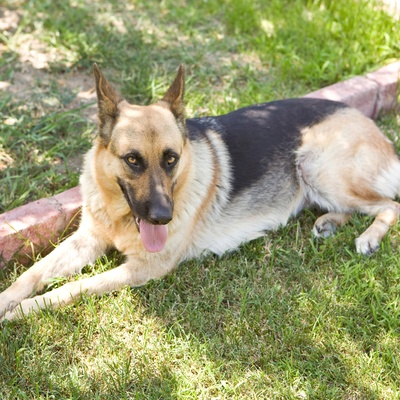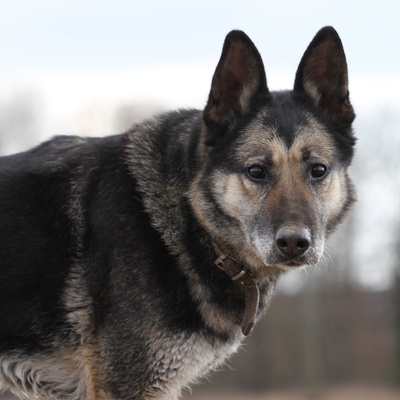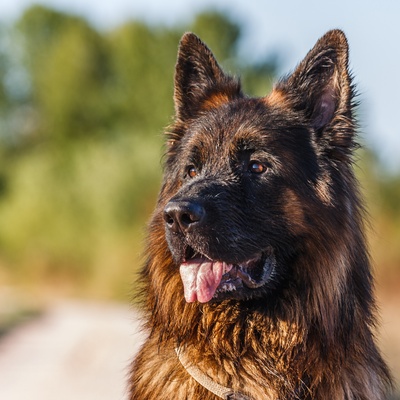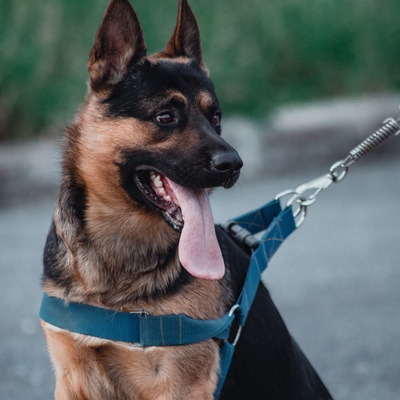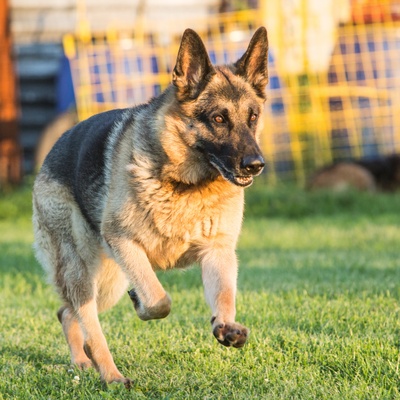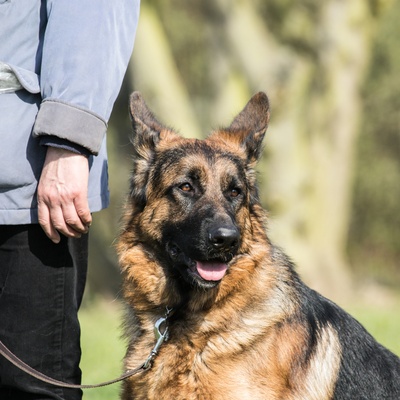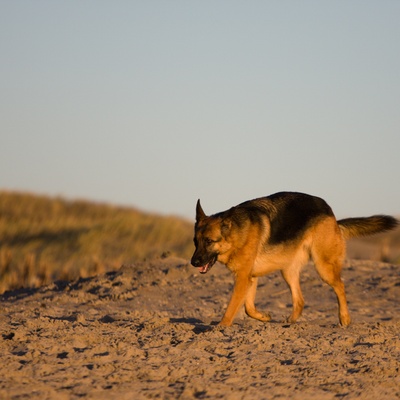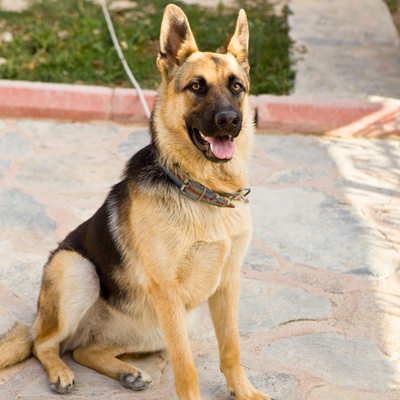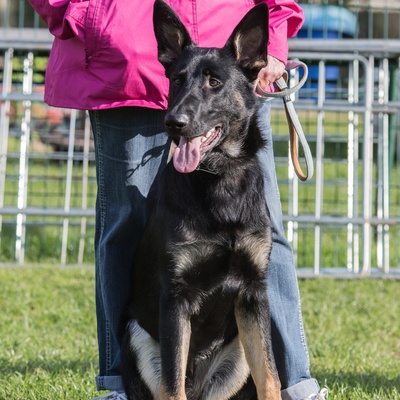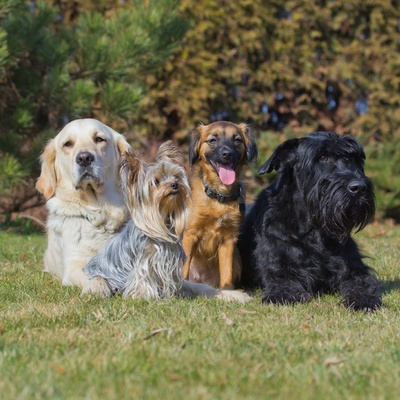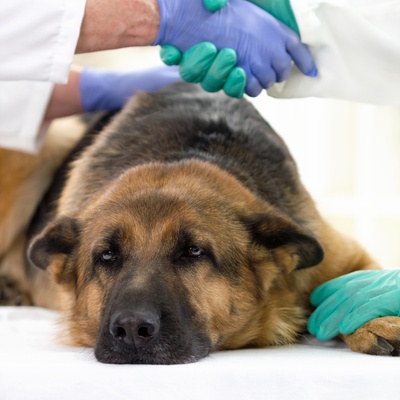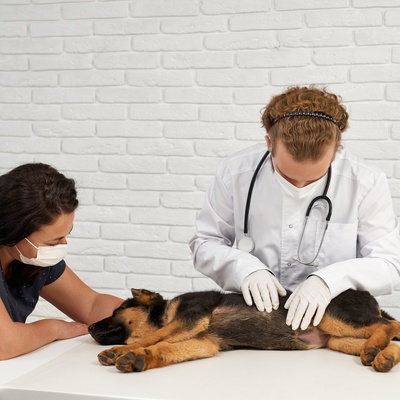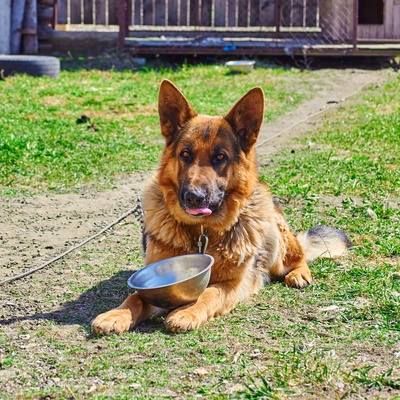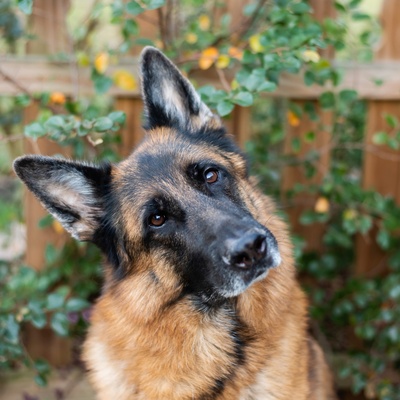Introducing the German Shepherd
Discover all there is to know about the German Shepherd: its characteristics, behavior, training, and its cost.
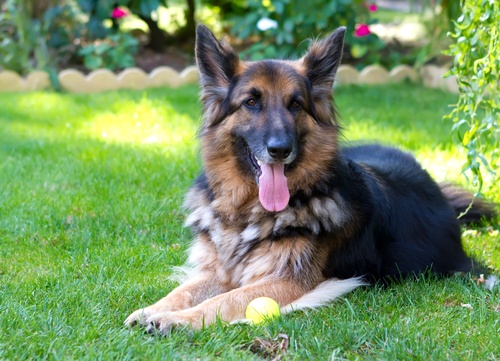
Discover all there is to know about the German Shepherd: its characteristics, behavior, training, and its cost.
The German Shepherd, a breed that originated in Germany as its name suggests, has a storied past. Initially bred for herding and protecting livestock, their role has evolved significantly over the years. Today, this breed stands among the most beloved and popular dogs worldwide, renowned for their bravery, intelligence, and versatility. The German Shepherd's aptitudes are numerous, ranging from roles in police and military service to being loving family pets and vigilant guard dogs.
Their nature combines the best of both worlds — they are fiercely loyal, yet incredibly affectionate, known for their deep bond with their owners. German Shepherds are sociable animals that show their affection through protective instincts and a constant readiness to engage in play and companionship.
This section outlines the unique features of the German Shepherd breed.
The German Shepherd is part of the Herding Group (group 1), which includes breeds that are historically adept at herding and guarding livestock.
German Shepherds are large dogs, with males typically ranging from 24 to 26 inches in height and females 22 to 24 inches. They usually weigh between 50 and 90 pounds, showcasing a strong and muscular build.
This breed is adorned with a double coat, with a dense, harsh outer coat and a softer undercoat. The length can be medium to long, providing ample protection from harsh climates.
While German Shepherds can sport a variety of coat colors, the most iconic is the black and tan combination. However, they may also display sable, all-black, all-white, and even blue or liver, albeit less commonly.
German Shepherds are adaptable to both country and city living, but they thrive in environments where they can exercise regularly, ideally with a yard or ample space.
Known for their loyalty, German Shepherds are typically sociable with their families and good with children if socialized properly.
German Shepherds are generally healthy, but like many large breeds, they're prone to certain conditions such as hip and elbow dysplasia and may have allergies.
Intelligent and eager to please, German Shepherds are relatively easy to train. Consistent, positive reinforcement works best, coupled with patience and kindness, to nurture their natural abilities.
We can help!
Every dog has its own character, and so do you. Making the right choice will ensure his well-being and yours.
Take our quiz to find out which breed is right for you, based on your personality, lifestyle, location and many other criteria.
Don't wait any longer and take the quiz to find out the answer!
German Shepherds are a blend of elegance and strength, with a balanced, athletic build that is also commanding. They typically have a distinctive black and tan coat covering a muscular body.
The German Shepherd is robust and tall, with females typically measuring between 22 to 24 inches, and males a towering 24 to 26 inches. Weight for females ranges from 50 to 70 pounds, while males tip the scales at a heftier 65 to 90 pounds.
This breed matures relatively swiftly, with their growth pace decelerating significantly after six months. Puppies only reach their adult size and weight at the age of 2 or 3 years.
The German Shepherd boasts a double coat, consisting of a dense outer layer and a softer undercoat. The outer coat’s length varies, typically medium to long, with a straight or slightly wavy texture, providing an effective barrier against various weather conditions. Notably, the breed often features a mane-like fringe around the neck and bushy tail, enhancing its noble appearance.
German Shepherds are renowned for their varied coat colors, predominantly tan with black saddle markings. However, they also appear in sable, pure black, pure white, and even blue or liver, though the latter two are considered faults in the show ring.
A German Shepherd's double coat is proficient at self-maintenance but does shed year-round, with heavier seasonal shedding. Regular grooming, including weekly brushing, becomes especially vital during the shedding seasons of spring and fall to help manage the loose fur and maintain the coat's health.
Despite their high shedding, the natural oils of their coat keep it relatively clean, necessitating baths only occasionally, depending on the dog's lifestyle and activity level.
The German Shepherd is the epitome of balance and proportion, exuding an impression of muscular fitness and high agility without any look of clumsiness. The breed possesses a noble head with a distinct, chiseled look, where the forehead is only slightly convex.
Their eyes are medium-sized, almond-shaped, and typically of a dark brown color, conveying a keen intelligence and alertness. Ears are wide at the base, pointed, high on the head, and carried erect when at attention, adding to their attentive expression. The body showcases a solid bone structure with a straight, strong back and well-muscled build, indicative of the breed’s versatility and physical prowess.
Renowned for their unwavering loyalty, German Shepherds are also protective guardians and affectionate companions.
With over 400 recognized dog breeds classified into 10 distinct groups, each group gathers breeds with common traits and capabilities. The German Shepherd falls under group 1, which is dedicated to herding and working dogs. This category includes breeds like the Border Collie, the Belgian Malinois, and the Australian Shepherd.
Breeds within this group are celebrated for their remarkable instincts, intelligence, and versatility. They are dogs that have been bred to gather, herd, and protect livestock, which often translates into strong protective instincts and high trainability in domestic settings.
German Shepherds epitomize these traits, showing off their developed instincts and exceptional intelligence. They are often gentle and affectionate with their families, but also showcase a disciplined and focused demeanor when engaged in tasks. Primarily, the German Shepherd is known for its roles in law enforcement, search and rescue, and service assistance, embodying the true spirit of a working and companion dog.
The German Shepherd is renowned for its admirable balance of intelligence and obedience, qualities that make it a standout breed for various roles and as a household pet. Characteristically alert and watchful, these dogs develop a deep bond with their owners, showcasing a level of affection that is as profound as their loyalty.
The German Shepherd's behavior reflects its protective nature, often displaying a clear sense of duty towards the family it considers its pack. For the German Shepherd to reach its full potential, a committed owner who is willing to invest time in training and interaction is essential. This breed thrives on purpose and engagement, making an attentive and present owner crucial for its well-being.
Social by nature, the German Shepherd exhibits a generous disposition towards both humans and other animals when properly socialized. Its inherent sociability means that it generally enjoys the company of humans and can be a good companion for children, displaying patience and protective instincts.
While they may be cautious around strangers initially, they warm up quickly once they assess no threat, thanks to their astute judgement. The socialization of a German Shepherd should start early; proper exposure to various people, environments, and situations ensures that the dog grows into a well-adjusted adult. It is this early training that harnesses the breed's natural sociability and shapes it into the dependable, approachable companion known to many.
The German Shepherd is a versatile breed capable of adapting to a variety of living situations, whether it be an apartment in the city or a spacious home in the countryside. However, due to their active nature and high intelligence, German Shepherds require consistent mental and physical stimulation regardless of their living situation.
The attention and engagement of their owner are paramount; a German Shepherd will not thrive without it. In terms of exercise, these dogs generally need at least one to two hours of vigorous activity daily to keep them physically fit and mentally sharp.
While German Shepherds can adjust to living indoors, they flourish in environments where they have ample space to explore and play. A yard or garden where they can patrol, sniff around, and engage in play is ideal for this breed, catering to their curiosity and need for regular exercise.
Access to a safe, outdoor area allows a German Shepherd to exhibit natural behaviors such as patrolling their territory and provides an outlet for their boundless energy. It’s important for owners to ensure that their environment also includes secure fencing, as German Shepherds may have a tendency to wander or chase if something piques their interest.
The German Shepherd is renowned for its keen intelligence and remarkable ease of training. This breed possesses a superior ability to learn commands and tasks rapidly, often requiring fewer repetitions than many other breeds. Training should capitalize on their eagerness to please and their capacity for focused attention, using positive reinforcement and consistent, structured methods.
Due to their intelligence and potential for protective behavior, establishing clear communication and authority is essential. To safeguard against their natural propensity to roam, especially in their early years, it is advisable to equip a German Shepherd with a GPS collar, ensuring their safety should they manage to escape or become lost.
German Shepherds are distinguished by their exceptional listening skills and their desire to connect with their handler, making them exemplary working dogs in various fields. They have a unique capacity to perceive and respond to subtle cues, which, combined with their intelligence, makes them suitable for roles ranging from police and military service to search and rescue operations.
Their training may require a handler who understands the breed's drive and can channel their focus effectively. With proper training, a German Shepherd's listening and response capabilities can be finely tuned, reflecting their remarkable loyalty and willingness to serve.
Take the test and find out the dog breed that matches your personality and lifestyle.
German Shepherds are known for their robust health and vitality, making them reliable companions both in work and at home. However, their well-being greatly depends on daily care and vigilance from their owners to prevent diseases and infections, ensuring a quality life.
Generally, German Shepherds are a breed with good overall health and a strong constitution. Nevertheless, they are not exempt from breed-specific health challenges. Common issues include hip and elbow dysplasia, a condition affecting the joint, and degenerative myelopathy, a progressive spinal cord disorder.
Additionally, this breed may also encounter bloating and gastrointestinal problems. Signs of these ailments can vary but may include discomfort, reduced mobility, or digestive disturbances. German Shepherds typically have a lifespan ranging from 9 to 13 years, with attentive care contributing to longevity.
Maintaining the health of a German Shepherd requires regular veterinary visits throughout the dog’s life for vaccinations, deworming, and parasite control. Daily home care is paramount and should include coat brushing several times a week to manage shedding, routine ear cleaning to prevent infections, dental care to avoid periodontal diseases, and nail trimming to prevent discomfort and mobility issues.
Additionally, being alert to the dog's food sensitivities or allergies and discussing them with a vet is crucial for their diet and overall health. German Shepherds are not considered a hypoallergenic breed, and this should be taken into account if allergies are a concern in the household.
Each dog breed comes with its own set of dietary demands, and the German Shepherd is no exception. A well-balanced diet is crucial for maintaining their well-known vitality and physical prowess. Their meals should be rich in proteins and fortified with essential vitamins to support their active lifestyle.
For German Shepherds, premium quality kibble that is formulated to meet the needs of this particular breed can provide a well-rounded nutritional base. For those German Shepherds that require additional protein, perhaps due to higher activity levels or recovery needs, supplementing their diet with lean meats such as chicken, turkey, or beef is beneficial, though it's essential to monitor fat intake to avoid unnecessary weight gain.
German Shepherds are highly esteemed for their intelligence, loyalty, and versatility, making them one of the preferred breeds worldwide. With their high demand, there are numerous breeders, but it’s important to consider several factors before adopting to ensure you're making a responsible decision.
The process of adopting a German Shepherd requires careful consideration. It's essential to find a reputable breeder; one indicator of this is their willingness to allow visits to their premises to observe the living conditions and demeanor of the dogs. The health of the puppy you're considering, as well as that of its parents, is paramount. A trustworthy breeder should be transparent about the puppy's health and any hereditary conditions in its ancestry.
Lastly, it's mandatory to have your dog microchipped by the age of 8 weeks and have their details registered on a recognized database such as Petlog or Animal Tracker. In Great Britain, failing to do so could lead to a
fine. While vets can microchip your dog for a fee, organizations like the Blue Cross offer this service for free.
The initial cost of a German Shepherd puppy can widely vary, influenced by factors such as the dog’s lineage, pedigree, breeder’s reputation, and the puppy’s age. Typically, you can expect to pay anywhere from
to
for a German Shepherd puppy.
However, it's essential to be prepared for the ongoing costs of ownership. On top of the initial price, annual expenses for things like food, veterinary care, training, and insurance can range from
to
, depending on various factors such as your location and the level of care you choose to provide.
Choosing a dog that matches your personality and lifestyle will ensure your well-being and his!
To access the most relevant information, suitable payment methods, and delivery in your region, please select the website corresponding to your country.
